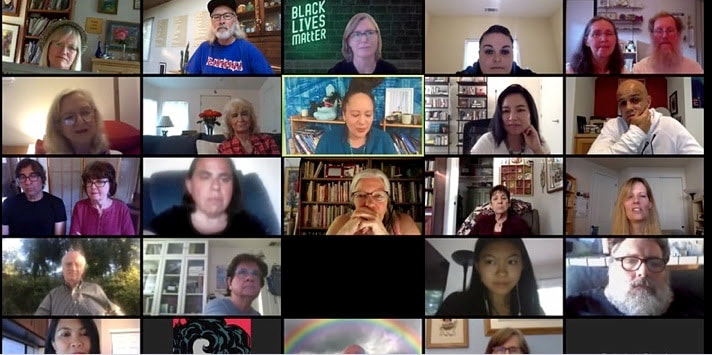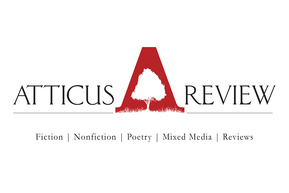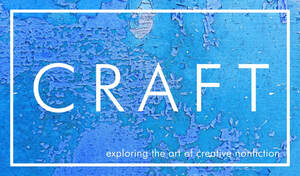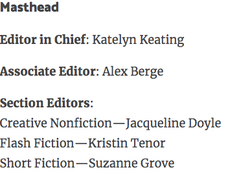|
Steve and I both read. We're rarely in the same reading, so that was fun. There we are on the left, looking distracted and in the dark. I still have no idea how to get the lighting right on Zoom. Their next reading is on August 12 at 7pm PST and you can register to attend here.
Just heard from FOURTH GENRE, slated to come out in August, that they're behind schedule. It is really a thrill of a lifetime to have an essay coming out with them. Haven't heard from SONORA REVIEW, which I think comes out around now each year, but I'm guessing they're behind schedule too. I don't know how print journals are even managing, with everyone working from home. Will I get my contributor's copies when there's no staff in the office to send them out? Online magazines seem to be doing okay. My ATTICUS REVIEW pub now has a firm date of October 1. MATCHBOOK hasn't told me my pub date. No idea what's happening with QUEEN MOB'S TEAHOUSE, originally planned for August, since their editor-in-chief stepped down in the midst of a scandal. I'm pleased to have pubs spaced out over the next few months, at journals I like so much. A plumber is coming today. First outsider we've had in the house since March, and despite social distancing protocols, it makes me nervous. Will life ever approach normal? California's death toll is still burgeoning. Our CNF at CRAFT will be posted every two weeks, alternating CNF flash and longer essays, and I won't post them all here, but this is just our second, and I'm so excited that we landed Ryan Van Meter's "First," which I've taught so often in my classes. (I taught his entire essay collection in my graduate seminar on contemporary memoir, and invited him to our campus to read.) I was worried about writing these craft-based introductions, but actually enjoyed writing the first four (all reprints that I chose because I like them so much; I was thrilled that the editor-in-chief agreed). Two more reprints to come, both wonderful. And hundreds and hundreds of CNF submissions are pouring in. Lots of hard decisions.
Ageism: why am I surprised? And why am I surprised when ageism is masked as its opposite? I was startled and offended to read this by an editor on twitter today: "Just finished working with an incredible writer for an essay we'll be publishing at xxx. She's in her sixties, and that voice, that lens, is rarely seen in the lit mag world. Like older women are supposed to write novels about detectives who love cats, or just stfu." It seems to me that most great essayists are over 60, or at least many (perhaps because it requires retrospect?), and that I read many writers over 60 in general, and I never dreamed that creativity after 60 might be surprising or noteworthy or that anyone was saying stfu. When I raised a mild objection, the editor answered by making the same point all over again. I'm sure she wouldn't dream of writing a tweet like this about a Black writer's submission, for example, or that a tweet like this about a Black writer would get 100 likes as this one did. The substitution should demonstrate what's wrong with treating a writer over 60 like this. Literary twitter suddenly feels a lot less welcoming, less like "my" community. (Ironically, this afternoon's Zoom event was a great conversation between Sharon Dolin and Kim Addonizio about Sharon's HITCHCOCK BLONDE. Both writers over 60 who are publishing all over the place. ) I love ATTICUS REVIEW! I published a short story there a long time ago, a microfiction more recently, and this will be my first essay, a short one where I assembled my recent micromemoirs featuring allegorical figures of Death. (I just got a super-nice rejection of one of the micromemoirs from CHEAP POP, almost as nice as an acceptance.) It feels like a while since I've had an acceptance. "Last Medley" won't be out until late September or October, but I figure Death and Covid-19 will still be on my mind. I hope the pandemic won't be much worse, but right now the statistics in California are alarming. We've suddenly gotten much, much worse and many Californians seem to be pretending that it's not happening.
Today's CDC statistics (and since the Trump administration wants states and hospitals to bypass the CDC and report numbers directly to them, we can no longer count on them): U.S. 4,280,135 cases (54,448 new cases) 147,672 deaths (1,126 new deaths) California 460,550 cases 8,445 deaths I'm pretty excited. Our first flash is up, Jaquira Díaz's "Girls, Monsters." I'm on the masthead. Submissions are pouring in.
 Big news, which goes public tomorrow: I've accepted a position as CRAFT Literary Journal's first Creative Nonfiction editor. I've been working on our launch behind the scenes with Katelyn Keating, the Editor in Chief, for a while. Chose some reprints to inaugurate their first-ever creative nonfiction publications and that was hard. Wrote craft-based introductions to the reprints, and that was hard too (also exhilarating, combining my scholar's and teacher's and writer's approaches to close reading). There have been some permissions difficulties, which Katelyn has been dealing with, so only three of the potential five are definite, all flash and essays that I love: Jaquira Diaz (who goes live tomorrow), Ryan Van Meter (a short essay I've taught many times), and Ira Sukrungruang. Fingers crossed about two more writers that I have my heart set on. When I was thinking about the introduction for Ira's beautiful flash "Because, the Ferguson Verdict," I ran across something he said in ESSAY DAILY earlier that year about why stories matter. "We live in a new America, I tell my students. A diverse America, a multicultural America, and our stories matter more now than in any part of our history. I tell them we are no longer under the thumb, but rather we are the thumb, and we are here to make an imprint on this country. … What I want to ingrain in my students—whether they will become writers or not, whether they will go on to write a memoir or not—is that they and their stories matter, that their tellings of their stories matter, that how they tell their stories matters most.” So much of what he says informed my years of teaching creative nonfiction and ethnic American literature. And it applies to my new editorial job too. CRAFT has a long-standing commitment to publishing diverse voices, a great team of editors and large, diverse team of readers. True stories "matter now more than in any part of our history," and "how" those stories are told matters too. I'm honored to be working with such a great editorial team and editor in chief. And excited by the challenge. |
Archives
July 2024
Categories
|




 RSS Feed
RSS Feed